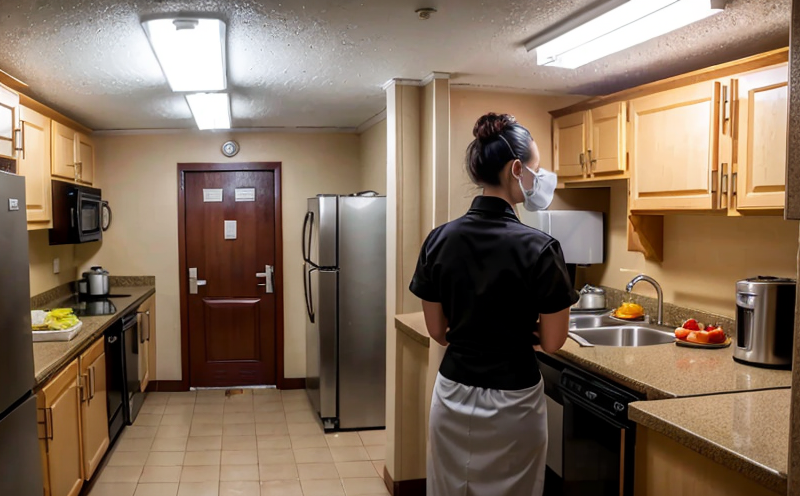Hotel kitchen hygiene inspection
In the hospitality sector, ensuring that kitchens meet stringent hygiene standards is critical to maintaining customer trust and satisfaction. A hotel's kitchen plays a pivotal role in food safety, which directly impacts public health and reputation. Our comprehensive hotel kitchen hygiene inspections are designed specifically for quality managers, compliance officers, R&D engineers, and procurement professionals who need to ensure their operations align with international standards.
The inspection process involves evaluating critical areas such as cleanliness of equipment, adherence to temperature controls during storage and preparation, proper handling of raw materials, and the overall maintenance practices that prevent cross-contamination. These inspections are crucial not only for regulatory compliance but also for enhancing food safety protocols and reducing the risk of foodborne illnesses.
Our team employs a multi-step approach to ensure thoroughness and accuracy:
- Initial assessment of kitchen facilities, including layout and cleanliness.
- Evaluation of staff training and adherence to hygiene practices.
- Review of procedures for handling raw materials and cooked foods.
- Inspection of equipment and storage areas, focusing on temperature controls and sanitation.
The data collected during these inspections is meticulously recorded in accordance with international standards such as ISO 22000:2018. This ensures that the hotel's kitchen operations are aligned with global best practices for food safety and hygiene.
Our experts also provide recommendations for improvements based on findings, helping hotels achieve higher levels of hygiene and compliance. The insights gained from these inspections can be invaluable in enhancing operational efficiency and reducing risks associated with poor hygiene practices.
| Key Areas Evaluated | Evaluation Criteria |
|---|---|
| Cleanliness of equipment | Assessment of cleanliness using visual inspection and microbial testing. |
| Adherence to temperature controls | Verification of proper storage temperatures for raw materials and cooked foods. |
| Handling of raw materials | Evaluation of procedures to prevent cross-contamination. |
| Overall kitchen layout | Review of the design and functionality of the kitchen space. |
The importance of a well-maintained hotel kitchen cannot be overstated. It is not only about adhering to regulations but also about building and maintaining trust with customers who expect safe, hygienic food. By partnering with our laboratory, hotels can ensure they are at the forefront of best practices in kitchen hygiene.
Benefits
- Enhanced customer confidence: Demonstrating a commitment to high standards of hygiene can significantly enhance guest satisfaction and loyalty.
- Regulatory compliance: Ensures that all operations comply with local, national, and international food safety regulations.
- Reduced risk: Minimizes the likelihood of foodborne illnesses, which can have severe financial implications for hotels.
- Improved operational efficiency: Identifying areas for improvement helps streamline kitchen processes and reduce waste.
The benefits extend beyond immediate compliance. Regular inspections lead to a continuous improvement process that ensures ongoing adherence to best practices in food safety and hygiene.
Industry Applications
- Hospitality: Ensuring safe, hygienic kitchens for guests.
- Retail: Maintaining standards of cleanliness in food preparation areas.
- Catering: Providing safe meals and snacks to clients.
| Key Applications | Description |
|---|---|
| Hospitality | Evaluating kitchen operations in hotels, resorts, and restaurants to ensure compliance with hygiene standards. |
| Retail | Inspecting food preparation areas in supermarkets, bakeries, and cafes for adherence to safety protocols. |
| Catering | Assessing the cleanliness of catering facilities to ensure that meals are prepared safely and hygienically. |
These applications underscore the importance of maintaining high standards in kitchen hygiene across various sectors, ensuring not only compliance but also a safer environment for all involved.
International Acceptance and Recognition
- ISO 22000:2018: This international standard focuses on food safety management systems. Compliance ensures that kitchen operations are systematically managed to minimize risks.
- HACCP (Hazard Analysis and Critical Control Points): A widely recognized system for identifying potential hazards in the production process and implementing controls to prevent them.
The acceptance of these standards across borders highlights their universal applicability. By adhering to these international norms, hotels can ensure that their kitchen hygiene practices are aligned with global best practices, thus gaining recognition from regulatory bodies and customers alike.





